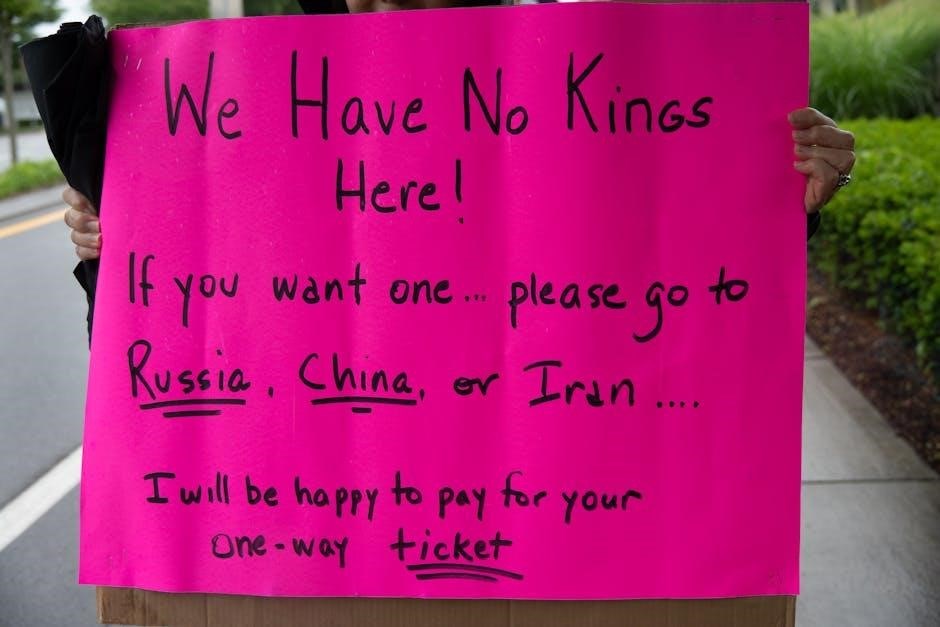The foundations of government are built on key ideas and concepts that shape its purpose‚ structures‚ and functions. Worksheets and educational resources provide interactive learning tools to explore these principles‚ helping students understand governance basics through hands-on activities and structured lessons.
1.1. Definition and Purpose of Government
Government refers to a system or group of people governing a community‚ state‚ or country. Its primary purpose is to maintain order‚ protect rights‚ and provide public services. Worksheets on this topic help students understand how governments are structured‚ their origins‚ and their roles in ensuring safety‚ justice‚ and economic stability for society.
1.2. Overview of Key Concepts in Government Foundations
Key concepts in government foundations include sovereignty‚ authority‚ legitimacy‚ and governance structures. These ideas form the basis of how governments operate and interact with society. Worksheets and educational materials often cover these topics‚ helping students grasp the fundamental principles that shape governance systems and their impact on communities and nations globally.
Types of Government
Types of government include democracy‚ authoritarianism‚ and monarchy‚ each with distinct structures and power distributions. Worksheets and educational resources help students compare these systems and their impacts.
2.1. Democracy: Government by the People
Democracy is a system where power resides with the people‚ either directly or through elected representatives. Key features include free elections‚ rule of law‚ and individual rights. Worksheets and activities‚ such as simulations‚ help students grasp democratic principles and their role in civic engagement‚ fostering an understanding of representative democracy and its global implications.
2.2. Authoritarian Government: Limited Political Pluralism
Authoritarian governments are characterized by centralized power and limited political pluralism‚ often restricting individual freedoms and opposition. Educational resources‚ such as worksheets‚ explore the differences between authoritarian and democratic systems‚ highlighting key concepts like control of media‚ limited elections‚ and suppression of dissent‚ helping students understand the implications of such governance on society and individual rights.
2.3. Monarchy: Leadership Based on Hereditary Rule
A monarchy is a system of government where leadership is passed down through generations‚ often within a royal family. The monarch’s role varies‚ from holding absolute power to serving as a symbolic figurehead. Worksheets on government foundations often include sections on monarchies‚ exploring their historical significance and how they differ from democratic or authoritarian systems in structure and governance.

Essential Features of a State
A state’s existence relies on four cornerstone elements: population‚ territory‚ sovereignty‚ and government. These features collectively define a state’s legitimacy‚ structure‚ and ability to govern effectively.
3;1. Population‚ Territory‚ Sovereignty‚ and Government
These four pillars define a state’s existence. Population refers to the people within its borders‚ forming the human foundation. Territory is the defined geographical area‚ giving the state its physical identity. Sovereignty ensures the state’s authority and independence‚ recognized by both its citizens and other nations. Government provides the framework for laws and governance‚ ensuring order and stability within the state’s boundaries.
3.2. The Role of Economic Systems in Government Structures
Economic systems significantly influence government structures by shaping resource allocation and policy-making. Command economies centralize control‚ while market economies emphasize private enterprise. Mixed economies blend both approaches‚ reflecting a balance of government intervention and individual freedom. These systems determine how resources are distributed‚ impacting societal welfare and reinforcing the government’s role in economic regulation and public policy‚ aligning with its foundational priorities.

Principles of Democracy
Democracy relies on free and fair elections‚ rule of law‚ and separation of powers to ensure accountability and protect individual rights‚ fostering civic engagement and equality.
4.1. Free and Fair Elections
Free and fair elections are cornerstone principles of democracy‚ ensuring that all eligible citizens can participate without coercion or discrimination. These elections guarantee equal voting rights‚ transparency‚ and accountability‚ fostering public trust in government legitimacy. Educational resources like worksheets and simulations help students understand the importance of these processes in maintaining democratic integrity and civic engagement.
4.2. Rule of Law and Protection of Individual Rights
The rule of law ensures that all individuals and institutions are governed by consistent‚ enforceable laws‚ promoting justice and equality. This principle safeguards individual rights‚ preventing arbitrary actions by those in power. Educational tools‚ such as worksheets and skits‚ help students grasp how legal frameworks protect freedoms and maintain societal order‚ fostering civic responsibility and respect for the law.
4.3. Separation of Powers and Checks and Balances
The separation of powers divides government into legislative‚ executive‚ and judicial branches to prevent concentration of power. Checks and balances ensure accountability among branches‚ safeguarding against abuse of authority. These principles uphold democratic governance‚ protecting individual rights and maintaining constitutional order through a system of mutual oversight and equitable distribution of power. Worksheets and lessons often emphasize their importance in maintaining stability and accountability.

The Social Contract Theory
Social contract theory posits that individuals voluntarily consent to a governed society to ensure mutual protection and order. Key philosophers like John Locke shaped its principles‚ influencing modern governance.
5.1. Origins and Influence on Modern Government
The social contract theory originated in the works of philosophers like Thomas Hobbes and John Locke‚ who explored the idea of consent as the basis for governance. These ideas deeply influenced modern government structures‚ emphasizing individual rights and the role of government in maintaining order. Educational resources‚ such as worksheets‚ often highlight these foundational principles to illustrate their enduring impact on political systems.
5.2. Key Philosophers: John Locke and His Contributions
John Locke‚ a prominent Enlightenment thinker‚ advocated for natural rights‚ including life‚ liberty‚ and property. His ideas shaped modern government by emphasizing consent and limited authority. Worksheets and educational resources often highlight Locke’s contributions‚ illustrating how his theories influenced democratic systems and the protection of individual rights‚ making him a cornerstone of political philosophy.
Historical Influences on Government Foundations
Historical documents like the Petition of Right shaped modern governance by limiting monarchial power and emphasizing rule of law‚ influencing democratic principles and constitutional frameworks globally.
6.1. The Petition of Right and Limited Government
The Petition of Right‚ enacted in 1628‚ was a pivotal document restricting King Charles I’s authority. It prohibited arbitrary arrests and forced quartering of soldiers‚ establishing the principle that the monarch’s power was not absolute. This laid the groundwork for constitutional monarchy and influenced later democratic reforms‚ emphasizing the rule of law and protection of individual rights.
6.2. The Impact of Enlightenment Thinkers
Enlightenment thinkers like John Locke‚ Rousseau‚ and Montesquieu profoundly shaped modern government. Their ideas on natural rights‚ social contracts‚ and separation of powers inspired democratic frameworks. Locke’s emphasis on consent and limited government influenced constitutionalism‚ while Montesquieu’s tripartite system remains foundational. These philosophers laid the intellectual groundwork for revolutions and reforms‚ reshaping political thought and institutions worldwide.

The Role of Government in Economic Systems
Governments regulate and influence economic systems through policies‚ laws‚ and public programs. They balance market freedom with oversight to ensure stability‚ fairness‚ and public welfare in various economies.
7.1. Command‚ Market‚ and Mixed Economies
Command economies rely on central planning‚ with governments controlling production and resource allocation. Market economies emphasize private enterprise and free trade‚ minimizing government intervention. Mixed economies blend both‚ balancing regulation with market freedom. Governments in mixed systems regulate key sectors while allowing private enterprise‚ aiming to ensure economic stability‚ public welfare‚ and equitable distribution of resources.
7.2. Government Regulation and Public Policy
Government regulation ensures economic stability by enforcing laws and policies that promote fair competition and protect public welfare. Public policy addresses societal needs through targeted initiatives‚ such as education‚ healthcare‚ and infrastructure. These policies are shaped by societal values and aim to balance individual freedoms with collective well-being‚ often through legislative and regulatory frameworks.

Theories of Government Origin
Theories of government origin explore how governance emerged‚ from evolutionary family units to divine right and social contract ideas‚ shaping modern political structures and authority.
8.1. Evolution from Family Units
The theory suggests that governments evolved from family units to organize extended families more effectively. Early societies transitioned from kinship-based leadership to broader governance systems‚ establishing formal structures to address collective needs‚ resolve conflicts‚ and maintain order. This evolutionary perspective traces the origins of government to the expansion of family-based authority into larger‚ more complex societal systems.
8.2. Divine Right and Other Theoretical Perspectives
The divine right of kings theory asserts that rulers derive authority directly from God‚ legitimizing their power as absolute and unquestionable. This perspective contrasts with social contract theories‚ which emphasize mutual agreements between rulers and the governed. Educational resources‚ like worksheets‚ explore these contrasting ideas‚ helping students understand how different theoretical foundations shape governance and legitimacy in various political systems historically.
Educational Resources for Teaching Government Foundations
Educational resources for teaching government foundations include worksheets‚ crosswords‚ and interactive simulations. These tools help students grasp key concepts through engaging‚ hands-on activities and structured lessons.
9.1. Worksheets and Crossword Puzzles for Key Terms
Worksheets and crossword puzzles are effective tools for teaching foundational government concepts. They introduce key terms like “sovereignty‚” “monarchy‚” and “democracy‚” while engaging students through interactive learning. These resources often include activities that align with lesson plans‚ fostering a deeper understanding of government structures and principles. Crosswords and word searches make learning fun and memorable for students of all ages.
9.2. Lesson Plans and Hands-On Activities
Engaging lesson plans and hands-on activities are crucial for teaching government foundations. Simulations‚ such as modeling different government types‚ allow students to experience decision-making processes firsthand. Role-playing exercises‚ like mock trials or legislative debates‚ foster critical thinking and civic engagement. These interactive approaches make complex concepts accessible and memorable‚ preparing students for active participation in their communities and future governance roles.

Simulations and Interactive Learning
Simulations and interactive activities‚ like role-playing exercises‚ engage students in experiential learning. These tools help students explore government types and civic responsibilities in a dynamic‚ immersive environment.
10.1. Government Types Simulation
A government types simulation engages students in decision-making processes under different governance models. Activities like “Gummy Bear Governments” or role-playing exercises illustrate how outcomes vary across systems. These simulations foster critical thinking‚ collaboration‚ and understanding of political structures‚ enabling students to explore real-world scenarios in a controlled‚ educational environment.
10.2. Role-Playing Exercises for Civic Engagement
Role-playing exercises are interactive tools that simulate real-world civic scenarios‚ fostering engagement and understanding of government operations. Students participate in activities that mimic decision-making processes‚ such as proposing solutions to community issues. These exercises encourage collaboration‚ critical thinking‚ and problem-solving‚ preparing students for active citizenship by immersing them in practical governance experiences.

The Importance of Civic Education
Civic education fosters understanding of government‚ rights‚ and responsibilities‚ equipping students to engage actively in society. It addresses contemporary challenges like disinformation and polarization‚ preparing informed citizens.
11.1. Preparing Students for Active Citizenship
Civic education empowers students to become active citizens by fostering critical thinking and problem-solving skills. Through interactive worksheets and real-world applications‚ students gain insights into government functions‚ enabling them to contribute effectively to societal issues and participate in democratic processes with confidence and awareness of their roles and responsibilities.
11.2. Addressing Contemporary Challenges
Civic education plays a vital role in equipping students to tackle modern issues like disinformation‚ political polarization‚ and global crises. By understanding government foundations‚ students develop critical thinking skills to address these challenges effectively. Interactive worksheets and real-world applications help them navigate complex societal problems‚ fostering informed decision-making and active participation in creating solutions for a better future.

Tools for Effective Learning and Assessment
Tools like worksheets‚ crossword puzzles‚ and flashcards reinforce key concepts in government foundations. These resources help students engage with material effectively‚ ensuring a comprehensive understanding of civic education principles.
12.1. Flashcards and Multiple Choice Questions
Flashcards and multiple-choice questions are effective tools for assessing foundational knowledge of government concepts. They test recall and comprehension‚ helping students master key terms and ideas. These resources are often included in worksheets and study guides‚ making them ideal for preparing students for higher-level thinking exercises‚ such as essays‚ while reinforcing their understanding of civic principles and government structures.
12.2. Essay Items for Higher-Level Thinking
Essay items are designed to assess higher-level thinking skills‚ encouraging students to analyze‚ synthesize‚ and evaluate information. These questions require students to connect concepts‚ explain theories‚ and apply principles to real-world scenarios. Essays help educators gauge critical thinking and the ability to articulate complex ideas clearly‚ fostering deeper understanding and application of government foundations. They complement multiple-choice questions by focusing on comprehensive analysis rather than simple recall.
Understanding government foundations is crucial for fostering civic engagement and informed citizenship. Worksheets and educational resources provide valuable tools for exploring these principles effectively and comprehensively;
13;1. Summarizing Key Concepts
The foundations of government worksheet pdf introduces key terms and concepts‚ such as the purpose of government‚ types of government‚ and economic systems. It emphasizes the importance of understanding governance through interactive activities and structured lessons‚ providing students with a comprehensive overview of civic principles and their real-world applications.
13.2. The Significance of Understanding Government Foundations
Understanding the foundations of government is crucial for fostering civic engagement and informed decision-making. It equips citizens to address contemporary challenges‚ such as disinformation and political polarization‚ by providing a clear grasp of governance principles. This knowledge empowers individuals to participate actively in democracy‚ ensuring they can navigate and contribute to societal issues effectively.
